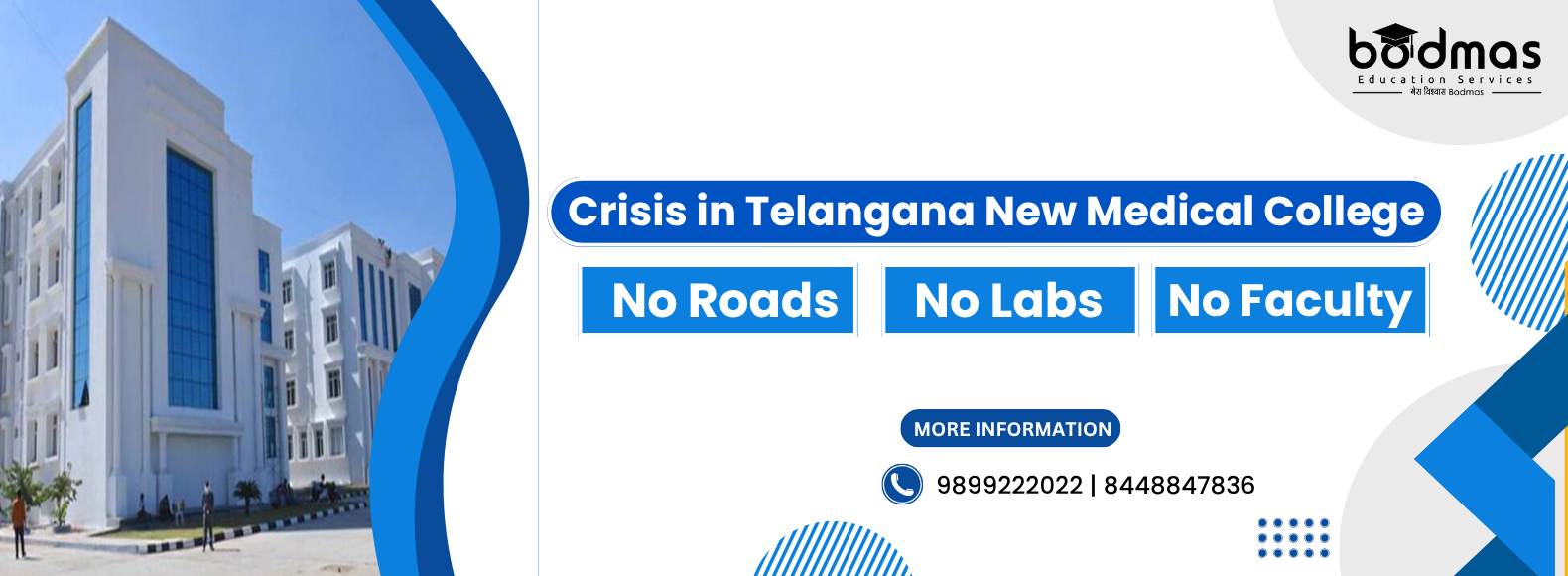Systemic Shortcomings in New Telangana Medical Colleges
1. Transportation & Safety Risks
- GMC Bhadradri Kothagudem: On 20 June 2025, five students were injured after an overcrowded auto overturned—students depend on unsafe alternatives due to lack of official transport. Despite multiple complaints and representations, the principal threatened to withdraw bus services if students continued raising the issue, and no administration officials visited the injured in hospital .
- GMC Mahabubabad, Mancherial, Karimnagar, Rajanna Siricilla, SIMS Ramagundam: Widespread reliance on private contractors charging steep fees, only a few buses for hundreds of students, and daily expenses up to ₹80—despite hostel-hospital distances of 2–12 km and daily commute hazards ().
2. Faculty Shortages
- NMC recently issued show-cause notices to 26 out of 34 government colleges due to severe staff deficiencies .
- Critical vacancies are seen in departments such as Anatomy, Biochemistry, Pharmacology, Microbiology—basic science faculties are often entirely missing ().
- Overall faculty deficit exceeds 50% at many major and new institutions, including Osmania, Gandhi, Kakatiya, and peripheral colleges like Nagarkurnool, Narayanpet .
3. Lab & Equipment Deficiencies
- Many labs are absent, non-functional, or lack essential equipment. Students from Asifabad report no cadavers; at Bhupalpally, less than 50% of required practicals are conducted; colorimeters and basic biochemistry tools missing ().
- SIMS Ramagundam, Mancherial: insufficient equipment means students fall behind in practical learning.
4. Hostel & Accommodation Crisis
- Hostels are temporary, overcrowded, unhygienic, often located far off-campus—some students housed 10–15 per rented flat or displaced to unconventional locations like old-age homes .
- Facilities lack basic hygiene, drinking water, fire safety—and students are compelled to skip meals to avoid missing clinical postings ().
5. Basic Amenities, Safety & Infrastructure
- Many campuses suffer from poor water supply, unreliable power, absent safety/security arrangements in hostels and hospital gates ().
- Teaching hospitals are frequently under-equipped, with low bed capacity, limited utilities (e.g., AC, water), and often remain under-utilised ().
6. Lack of Digital & Recreational Resources
- Around 57% of colleges lack sufficient internet, 71% of hospitals have no Wi‑Fi, and libraries operate on limited hours ().
- No sports grounds, fitness facilities; students forced to pay external fees for gyms in some cases .
7. Administrative Apathy & Reprisal
- Students raising concerns are often threatened with punitive action, ignored, or refrained from voicing legitimate grievances .
- GMC Nirmal reportedly has received no government funding since 2023; students describe a “foul” and unsanitary environment.
Summary Table of Issues by College
College | Transportation Issues | Faculty Shortage | Labs & Equipment | Hostel / Accommodation | Basic Amenities & Safety | Digital & Recreational | Admin Apathy / Reprisal |
GMC Bhadradri Kothagudem | ✔️ severe | ✔️ severe | ✔️ moderate | ✔️ severe | ✔️ moderate | ✔️ moderate | ✔️ severe |
GMC Mahabubabad | ✔️ severe | ✔️ severe | ✔️ moderate | ✔️ severe | ✔️ moderate | ✔️ moderate | |
GMC Mancherial | ✔️ moderate | ✔️ severe | ✔️ moderate | ✔️ moderate | ✔️ moderate | ✔️ moderate | |
GMC Karimnagar | ✔️ moderate | ✔️ moderate | ✔️ moderate | ||||
GMC Rajanna Siricilla | ✔️ severe | ✔️ moderate | |||||
SIMS Ramagundam | ✔️ severe | ✔️ moderate | ✔️ moderate | ✔️ moderate | ✔️ moderate | ✔️ severe | ✔️ moderate |
GMC Bhupalpally | ✔️ moderate | ✔️ severe | ✔️ severe | ||||
GMC Asifabad | ✔️ moderate | ✔️ severe | |||||
GMC Sangareddy | ✔️ severe | ✔️ moderate | ✔️ moderate | ||||
GMC Quthbullapur | ✔️ severe | ||||||
GMC Nirmal | ✔️ severe | ✔️ moderate | ✔️ severe |
Notes: “✔️” indicates issues highlighted by student complaints or reports. Severity graded as “moderate” or “severe” based on scale of impact and pervasiveness.
Statewide Response & Path Forward
- Government intervention: Chief Minister Revanth Reddy formed a high-level committee on 17 June 2025 to assess all 34 government medical colleges, promising funded reforms and digital tracking of improvements .
- NMC action: Show‑cause notices were issued on 16 June to 26 colleges over infrastructure and faculty gaps; NMC is pushing for urgent remediation .
- Monitoring panels: On 19 June, Telangana Health Department created 10 Medical College Monitoring Committees to evaluate and remediate issues before June 2028, covering parameters from infrastructure to safety .
- Faculty recruitment drive: Though 1,061 out of 1,442 approved assistant professorships have been filled (381 remain vacant), significant efforts are underway to expedite recruitment and transfers .
Telangana’s rapid rollout of 24 new government medical colleges since 2022 was aimed at increasing medical seats but has resulted in widespread infrastructural weakness across transportation, labs, faculty, accommodation, and digital resources. Students are suffering the consequences, often facing institutional indifference.
While state authorities and regulators have initiated response mechanisms, a focused and transparent action plan—backed by consistent monitoring and timely delivery—is essential to transform these “colleges on paper” into fully functional institutions capable of delivering quality medical education.
Powered by Froala Editor




